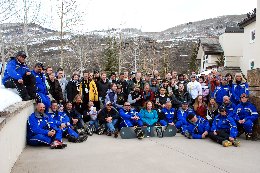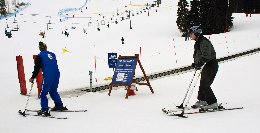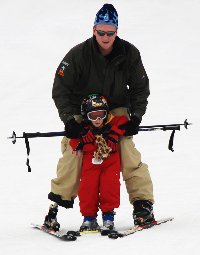
All 25 military participants in the Vail Veterans Program, their guests, and instructors gathered for a group photo March 11, in Vail, Colo., before their last day of fun in the snow. The veterans received three days of private lessons in skiing or snowboarding from adaptive ski and snowboard instructors trained to work with disabled athletes. Photo by Samantha L. Quigley
|

Army Staff Sgt. Brian Beem, who lost his right leg below the knee in Iraq, makes the transition to stand-up skis and modified poles March 11 in Vail, Colo. Through the Vail Veterans Program, Beem (right) had spent the previous two days getting proficient with a seated ski. Photo by Samantha L. Quigley
|

Army Maj. David Rozelle, using a special prosthesis designed to fit into a regular ski, helps his 3-year-old son, Forrest, down the beginner hill. Rozelle, lost who lost part of his foot in Iraq in 2003 and then returned to duty there, now serves as administrator for Walter Reed’s Amputee Care Center. Photo by Samantha L. Quigley
|
|
VAIL, Colo., March 11, 2007 - As the Vail Veterans Program wrapped up the last day of its fourth annual winter sports clinic here yesterday, the veterans and their guests expressed their appreciation for what they’d gained at the four-day event.
Of the 25 veterans, 20 were participating in the Vail Veterans Program for the first time, and many had never skied or snowboarded before. From the beginning of their adventure through yesterday, Army Dr. (Capt.) Allison Franklin, a physical medicine and rehabilitation specialist at Walter Reed Army Medical Center, in Washington, said the veterans experienced a change of spirit.
“The ones who’ve never done it before or did it before they got hurt are definitely apprehensive, … but they’ll never tell you,” Franklin said. “By today they’re feeling pretty good because they’re up on the hill. They’re happy, and they’re smiling, and it’s completely different.”
They take those positive feelings back to Walter Reed, she said. They realize that all the exercises they’ve been learning and the medications they’ve been taking help them to do things many of them thought they couldn’t do since being injured.
“It gives them confidence … to say, ‘Hey, I’ve never snowboarded before, but now I can,’” Franklin said. “(That) can translate into, ‘Well, I didn’t think I could do this anymore either, but I didn’t think I could (snowboard) either, and now I’m going to try at least.’”
While she credits these changes, in large part, to the Vail Veterans Program, the Vail community earned her kudos as well. The whole community came together and was very welcoming, she said. “They’d do pretty much anything for these guys,” Franklin said.
Sandy Homuth, accompanying her son Army Spec. Jeremiah Homuth, who lost his right arm while serving in Iraq, reported similar observations.
“He was really nervous; he was really apprehensive,” Homuth said. “He felt like he’d never be able to do it.”
She said watching other injured veterans working through the same struggles motivated her son.
“I think it’s been freeing for him, in a way, thinking that, ‘Wow, I can accomplish this missing my right arm,’” she added.
Simply coming to Vail was a big step for her son, Homuth said. Spc. Homuth has been at Walter Reed since June 16, and this is only his third trip from the hospital.
“He hasn’t been home (to Illinois) yet because he’s so nervous,” she said. “If it wasn’t for a couple of guys he knew coming here, I think he would have definitely not wanted to be a part of it.
“Now he’s made some other tremendous friends,” she said.
She and her husband, along with Jeremiah’s occupational therapist at Walter Reed, encouraged their son to take this trip. They saw it as an opportunity for him to get back into the world outside the hospital and not feel like people are going to treat him any differently.
“This is going to help him to come home,” Homuth said.
Through tears, she expressed her gratitude for the Vail Veterans Program and the support it provides not only the recovering veterans, but also their loved ones.
“This is such a healing program, and it’s healing for me too,” she said. “To see my son be able to do something like this, it’s been emotional for me too … because my husband and I are scared too.
“(This) gives us encouragement to keep encouraging him,” she added. “I’m telling you, it really does touch the soul.”
And that, according to Army Reserve Cpl. Harvey Naranjo, an occupational therapist at Walter Reed, is just what the veterans need.
“They always get recharged. You’ve got to recharge to get better, go out there and get back to life,” Naranjo said.
Army Sgt. Brian Fountaine has found that to be true through the course of the program, he said. He said he’s learned there are ways to do what he wants in life and that the public can be very supportive.
“I just think it’s awesome,” Fountaine, who lost both of his legs below the knee in Iraq, said. “It’s taken guys and given them liberties and freedoms and just feelings of exhilaration and excitement again that they haven’t felt in -- some of us -- over a year.”
|